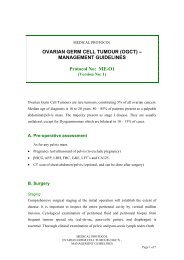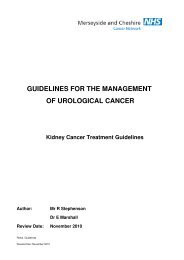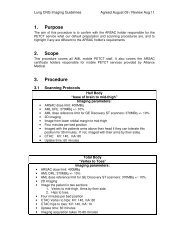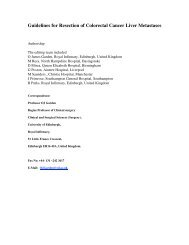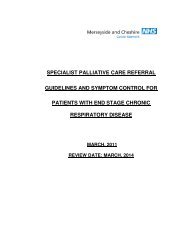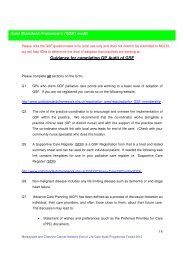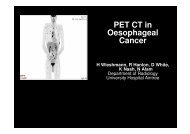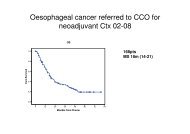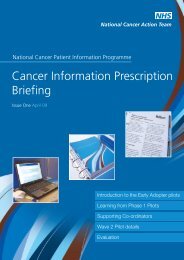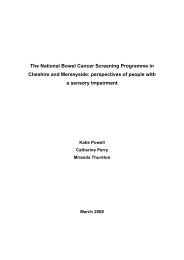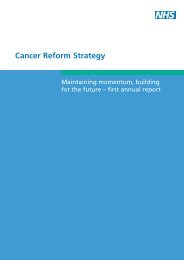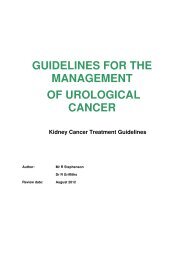Cancer Reform Strategy - NHS Cancer Screening Programmes
Cancer Reform Strategy - NHS Cancer Screening Programmes
Cancer Reform Strategy - NHS Cancer Screening Programmes
- No tags were found...
You also want an ePaper? Increase the reach of your titles
YUMPU automatically turns print PDFs into web optimized ePapers that Google loves.
CHAPTER 6: REDUCING CANCER INEQUALITIES 85●●Access to diagnostic and treatment services;andProvision of information and support.psychological support, assistance with gettingback to work or claiming the financialsupport to which they are entitled, will helpmore economically deprived groups in society.6.4 This chapter outlines how the differentannouncements and recommendations in the<strong>Cancer</strong> <strong>Reform</strong> <strong>Strategy</strong> will impact oninequalities and also sets out an overview ofsome of the major causes of cancer inequalitytogether with recommendations for local actionto reduce these inequalities.The impact of the <strong>Cancer</strong> <strong>Reform</strong><strong>Strategy</strong> on inequalities6.5 The <strong>Cancer</strong> <strong>Reform</strong> <strong>Strategy</strong> includes anumber of actions which should help reduceinequalities:6.6 However, we also recognise that some ofthe measures we are taking may, at least initially,widen inequalities:●●Measures to improve awareness ofprevention messages as well as the signs andsymptoms of cancer are likely to bedisproportionately acted upon by theinformed and articulate;Expanding screening will benefit everyonewho is eligible, but groups with lower levelsof uptake will experience less benefit; and●●●●●●Action on smoking will particularly benefitgroups in society with higher rates ofsmoking prevalence, such as manual workersand some BME communities;Measures to ensure faster referral anddiagnosis for people where cancer issuspected will help those who may be lessinformed about cancer signs and symptoms;Reducing cancer waits will enable fastertreatment for all patients;Expanding radiotherapy capacity will reduceinequalities in the availability of a treatmentwhich benefits over half of all patients withcancer;A commitment that as a default positionnew cancer drugs and significant newlicensed indications will normally be referredto NICE and to ensure that NICE appraisalguidance is available as early as possible;Improved information and a new focus onimproving the experience of cancer patientswill ensure that all patients are given theappropriate information, advice and supportthroughout their cancer journey; and●Affluent and articulate people are more likelyto make immediate use of information aboutthe performance of hospitals.Further national action to tackleinequalities6.7 A major challenge in reducing inequalities incancer is the lack of evidence about the extentto which different forms of inequalities exist,what causes them and what interventions willbe most effective in addressing them.6.8 In recognition of this challenge we willbegin a National <strong>Cancer</strong> Equality Initiative,bringing together key stakeholders fromthe professions, voluntary sector, academiaand equality groups to develop researchproposals on cancer inequalities, testinterventions and advise on thedevelopment of wider policy. The National<strong>Cancer</strong> Equality Initiative will initiallyfocus on:●●Optimising data collection to enhanceour understanding of the inequalitiesthat exist;Promoting research to fill gaps in theevidence; and●Greater help for people who have survived orare living with cancer, including better●Spreading good practice.



